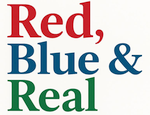America’s strength—economic, civic, and military—has never come from wealth. It has always come from the people who keep the country running.
The workers. The citizens. The millions building, repairing, transporting, teaching, learning, and growing.
We call it the “middle class,” but that label is fraying. Today, millions of full-time workers can’t afford an apartment, a car repair, or a future.
Many can’t even afford to work—because without housing, transportation, or childcare, holding a job is out of reach.
And many who once lived securely in the middle class have been pushed down into poverty—or worse, into homelessness.
This group—the ones doing the work, holding up the country—are the body of the nation.
And when the body breaks down, the whole system fails.
When this group is stable, America is strong. When it collapses, the nation fractures.
That’s not just an economic concern—or a “social issue.” This is a national security risk.
What Happened to the Middle
The post-WWII middle class wasn’t an accident. It was built through public investment, strong labor protections, and fair taxation.
Wages grew with productivity. Families bought homes, sent kids to college, and looked to the future with confidence.
Over the past 40 years, that foundation was deliberately dismantled.
Wages stagnated. Unions were weakened. Public services improved under some administrations—but are again under attack.
Today, the American worker is often one emergency away from collapse.
Far too many who should be part of the middle are shut out entirely—not because they won’t work, but because life is unaffordable.
That’s not a moral failure. It’s a structural one.
And when enough people lose access to stability, the nation itself becomes brittle, unprepared, and more vulnerable.
Wealth Hasn’t Just Concentrated—It’s Been Extracted
This isn’t a story of the rich getting richer.
It’s about wealth being pulled from the base and funneled upward.
Low wages and unstable jobs push workers onto public assistance—while corporations post record profits.
For decades, companies have paid wages so low their workers qualify for food stamps—outsourcing labor costs to the public.
This is extraction and extortion, packaged as efficiency.
Now, with safety nets unraveling—the natural result of policies that weaken the American body—the illusion is collapsing.
You can’t hollow out a nation’s base and expect it to stand.
Without investment in the people who hold the country up, we are not a functioning society.
This Is a National Security Issue
Most people think of national security as weapons, borders, and foreign threats.
But real security depends on internal strength—the ability to endure crisis, adapt, and stay united.
A strong middle class creates that strength.
It’s the middle class that staffs the military, drives ambulances, teaches the children, and keeps the lights on.
It’s the middle class that responds to disasters and keeps the country moving.
And when it’s stable, it believes in the system, participates in democracy, and pushes the country forward.
When that stability breaks down, the consequences ripple outward.
Fear replaces faith.
Fear turns to anger.
When people are angry, everything is at risk:
— Trust evaporates—not just in government, but in daily life
— Crisis management slows; people can’t recover if they’re already on edge
— Authoritarian movements gain ground; strongmen sound convincing when systems feel hollow
— Fear seeks a target, fueling division and scapegoating—fertile ground for propaganda
This is present reality.
You don’t achieve national security by concentrating wealth at the top.
You create fragility—a country stretched thin, with too few holding up too much.
We Can Choose a More Secure Path
The strongest middle class in American history didn’t just magically appear.
It came from deliberate choices:
- Investment in education
- Affordable housing
- Labor protections
- Public health
- Fair taxation that prioritized broad prosperity
And for a time, it worked.
We built an economy that lifted people up—and supported those who couldn’t stand on their own.
We can choose that path again. This time, we don’t have to guess what works.
We already know.
Rebuilding Strength from the Ground Up
Here’s what a strong, secure nation looks like:
— Wages and worker protections
— Affordable housing and modern infrastructure
— Healthcare built for health, not profit
— Public education that opens doors
— Fair taxation and closed loopholes
— Responsive government that adapts to changing needs
These are pragmatic facts—grounded in economics, history, and common sense. They all serve one purpose:
To restore strength to the part of America that makes it work.
In the end, national security isn’t about defense. It’s about durability.
A country that abandons its middle implodes.
A country that invests in its people becomes unbreakable.
Let’s choose strength.
Let’s rebuild the middle.
Related Reading:
Explainer: Why a Strong, Healthy Middle Class Matters
Opinion: America’s Middle Class Will Not Save Itself
